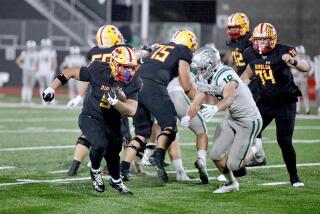NCAA: Bowls Up to Teams : Colleges: Executive Director Schultz says the organization cannot prevent schools’ playing in Arizona games.
- Share via
Even if it wanted to, the NCAA is powerless to prevent member schools from playing in the Arizona-based Fiesta Bowl and Copper Bowl, NCAA Executive Director Dick Schultz said Tuesday. In addition, the organization has not formulated an official stance on the controversy resulting from the failed Martin Luther King Jr. holiday referendums in the state.
“If we tried to step in and do something, we’d probably face some serious legal challenges,” Schultz said. “I think it’s something the schools are going to have to decide on their own and see how it fits.”
Schultz said that, if asked, the NCAA could make a recommendation to a school considering an invitation to the Fiesta Bowl or Copper Bowl. But he added that such a recommendation wouldn’t carry much weight. In the end, the decision to attend or decline would be the school’s alone.
“Part of our problems with the bowls is that they’re a private enterprise, and we just can’t exercise much control over them,” he said. “They’re certified and sanctioned (by the NCAA), but our control stops there.”
Schultz was in Southern California to meet with Big West officials, as well as to conduct a question-and-answer session with editors of The Times. Coincidentally, Schultz flew to Phoenix late Tuesday to address Fiesta Bowl organizers. He had agreed to speak to the Fiesta Bowl group six months ago. Since then, the timing of such a visit has gone from pleasure to pure business.
“I hate to see athletics involved in the political process, but they’ve been there before, and I don’t think there’s any way to separate the two any more,” Schultz said.
“I just think it’s very unfortunate when this type of situation happens. Bowls should be a reward for a school and athletes because they’ve had a special season. And now for a lot of them, it’s not going to be that all. If those teams do go ahead and play, there’s going to be a whole cloud hanging over that. I think you’re seeing that pressure starting to build over California.”
The Cal football team voted Monday to accept a bid from the Copper Bowl, which is played in Tucson. Shortly thereafter, the NAACP condemned the university for its actions. Cal will face Wyoming in the Dec. 31 game.
As expected, Louisville announced its intention to accept a Fiesta Bowl invitation to play one of three Southeastern Conference teams--Tennessee, Auburn or Alabama. Apparently, the game at Tempe, Ariz., on Jan. 1 will have its pick of the three.
“I think we all knew it would be controversial,” Louisville President Donald C. Swain told reporters Tuesday. “We were not surprised that it does turn out to be controversial. I do respect the views of other people who disagree with our decision. I hope they’ll respect our views.”
Said Louisville Coach Howard Schnellenberger: “You have to understand that sports is something that is out of the realm of politics, and certainly, if done in the right way, politics will not enter into this thing.”
Mississippi, which is 8-1, isn’t expected to be included in the Fiesta mix. Bowl organizers preferred the drawing power of traditional powers, such as Tennessee, Auburn and Alabama, to the untested marquee value of Ole Miss. There is a feeling that those three schools will help television ratings and attract more fans than would a Mississippi-Louisville matchup.
Still to be determined is the effect of the King holiday controversy on the Fiesta Bowl and Copper Bowl.
“I think this caught everyone by surprise--I think the people in Arizona more so than anyone else,” Schultz said. “The polls going into this election showed a big margin of favoritism for passing it.”
Asked if the NCAA was in a position to defuse the situation, Schultz said the organization was helpless in this case. “I’m not sure we could do anything,” he said.
The NCAA has little control over the number of bowls, the dates they are played and for the most part, where they are played. The NCAA sets certification standards, which deal mainly with minimum payout standards. A racial scenario involving its bowls obviously wasn’t expected. In fact, Schultz was unaware how many states were without King holidays (three: New Hampshire, Montana and Arizona).
“We’re pretty much limited to establishing certain financial guarantees and priorities for the bowls,” he said. “We’re just not in the position to take a look at that particular issue. Now, if it were one of our championships, like (the NFL and its) Super Bowl, then that would be a different thing. Then we can determine all the policy: When it’s going to be played and how it’s going to be conducted. But this is a little different situation.
“It’s kind of a never-never land in a way for the NCAA,” he said.
More to Read
Go beyond the scoreboard
Get the latest on L.A.'s teams in the daily Sports Report newsletter.
You may occasionally receive promotional content from the Los Angeles Times.










